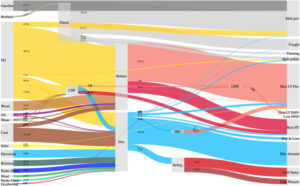Rethinking Job Evaluation in the Era of Digitalization: Navigating the New World of Work
UncategorizedIntroduction
In the era of digitization, the job environment is fast changing. Technology is transforming sectors, redefining employment responsibilities, and undermining established job evaluation methodologies. As organisations embrace digital change, it is critical to reconsider how we evaluate occupations in this changing context. In this blog article, we’ll look at how digitalization affects job evaluations and suggest techniques for effectively adapting to these changes.
Understanding Job Evaluation
Job evaluation is an organised approach that determines the relative value of various positions within an organisation. It entails evaluating numerous aspects such as abilities, responsibilities, and qualifications in order to build fair and equitable compensation systems. It also includes specific objectives, such as determining fair pay disparities across different jobs in the organisation, eliminating wage inequities, developing a consistent wage policy, providing a foundation for wage negotiations with trade unions, and providing a framework for wage rate revision.
Traditional job evaluation methods frequently contain job descriptions, hierarchical structures, and standardised criteria. However, the digital revolution has upended these traditional practices. Jobs are becoming increasingly flexible, multifaceted, and interrelated, undermining the idea of a set work definition. With the development of remote employment, gig economy platforms, and AI-powered automation, the lines between occupations are becoming more and more blurred.
Importance of Job Evaluation
• The method eliminates salary inequalities by rating jobs logically and objectively.
• Improves industrial relations • Increases employee satisfaction • Provides a clear and objective foundation for pay discussions and collective bargaining.
• Improves wage administration by making rates more consistent.
• Identifying occupations with varying skill levels leads to higher staff utilisation.
• JE data helps with personnel selection, placement, and training.
Impact of Digitalization on Job Evaluation
Shift to Skills-Based Evaluation: In the digital age, the emphasis is changing from job titles to competencies. As new technologies develop and work roles shift, it is critical to assess individuals on their abilities rather than established job definitions. Skills-based evaluation enables organisations to respond more flexibly to changing needs and fosters a culture of ongoing learning.
Digitalization has resulted in the rise of dynamic employment roles that need flexibility, adaptability, and transdisciplinary abilities. Traditional job assessment systems may fail to represent the complexities of these professions, resulting in inequities in pay and recognition. Organisations must create agile evaluation systems that can handle quick changes in job duties and needs.
Remote Jobs and Online Teams:
The increased acceptance of remote work has eliminated geographical constraints, allowing organisations to access worldwide talent pools. However, evaluating distant employment has new issues, such as assessing performance in virtual settings and guaranteeing fair treatment of remote workers. To be fair and transparent, job assessment methods must take these elements into consideration.
Automation and AI:
Technologies that enable automation are changing the nature of work by automating ordinary activities and complementing human skills. While artificial intelligence can increase production and efficiency, it also raises worries regarding loss of employment and the projected future of labour. work evaluation systems must take into account the influence of automation on work content, competencies, and career routes, ensuring that people are fairly paid for their efforts.
Remote Performance Monitoring:
With the development of remote work, digital solutions allow organisations to better track employee performance and productivity than ever before. Employers can use tracking time software, tools for project management, and communication platforms to collect information on their workers’ work habits, output, and collaboration. Job assessment systems may need to include measurements produced from these digital technologies in order to correctly and fairly assess remote workers’ performance.
Global Talent Pool:
Organisations may now hire talent from all around the world thanks to remote job opportunities and internet recruiting platforms. The globalisation of the workforce has created new difficulties and possibilities for job evaluation. Organisations must design evaluation standards that take into consideration the varying talents, experiences, and cultural backgrounds of their employees from various areas and nations. In a global setting, job assessments may also need to take into account variables such as language fluency, cultural competence, and telecommuting abilities.
Digital Skills Gap:
Digitalization has accelerated the demand for employees with specialized digital skills such as data analysis, coding, and digital marketing. However, there is often a mismatch between the skills required for digital roles and the skills possessed by existing employees. Job evaluation processes need to identify skill gaps within the organization and prioritize investments in training and development to bridge these gaps. Additionally, organizations may need to revise job descriptions and evaluation criteria to reflect the increasing importance of digital skills in the workplace.
Adapting to the New Paradigm
Embrace Agility:
Agile work techniques like scrum, kanban, and lean approaches, which emphasise flexibility, cooperation, and iterative improvement, have grown in popularity as a result of digitalization. Job evaluation systems must adapt to agile work methods by including more frequent, informal feedback mechanisms and performance assessments. Organisations may need to replace traditional yearly performance evaluations with agile performance management techniques that prioritise constant feedback, coaching, and goal setting.
Invest in Skills Development:
Given the rapid speed of technological change, investing in employee skill development is critical. Organisations should give chances for upskilling and reskilling to keep personnel relevant in the digital era. Organisations may help people flourish in changing job positions by cultivating a culture of continual learning.
Promote Transparency and Equity:
Transparent job assessment systems are critical for instilling trust and fairness in an organisation. Employers should be clear about the criteria used for job appraisal and ensure that judgements are made based on objective criteria rather than subjective bias. Organisations should also work to reduce gender and diversity biases in job evaluations in order to promote equity and inclusion.
Utilize Technology:
Using technology can help to speed the job evaluation process while also improving accuracy and efficiency. AI-powered analytics solutions may assist discover skill shortages, assess job performance, and compare wages to industry norms. Organisations may make more informed job appraisal and people management choices by using the power of technology.
Flexible Work Arrangements:
Digitalization has accelerated the growth of ways to work remotely featuring freelance jobs, gig economy platforms, and remote employment. These non-traditional employment models pose problems to standard job evaluation methodologies since they frequently entail project-based labour and changeable hours. Organisations must establish new techniques to assessing the value of freelancers, contractors, and remote workers, to make sure they are adequately paid for their efforts.
Data-Driven Decision Making:
Digitalization has enabled businesses to acquire massive volumes of data about worker efficiency, effectiveness, and contributions. Organisations may acquire a better understanding of the value of various job categories and the abilities required to thrive in the digital age by utilising data analytics as well as machine learning algorithms. Data-driven job evaluation may help organisations make better decisions regarding people management, allocation of resources, and strategic planning.
Cross-Functional Collaboration:
Digitalization has dissolved the distinctions between departments and job functions, resulting in greater cooperation within teams and specialties. Traditional job assessment systems may struggle to capture the contributions of individuals who operate in many areas of the organisation. Organisations should create assessment frameworks that recognise and reward cross-functional cooperation, encouraging people to exchange information, skills, and expertise across silos.
Prioritise outcomes over inputs:
In the digital era, success is frequently defined by consequences rather than inputs. Traditional job assessment techniques prioritise characteristics such as years of experience, education level, and hours spent above the outcomes obtained. Organisations must adapt to outcome-based assessment criteria that assess the impact of workers’ efforts on corporate goals, customer happiness, and innovation. By concentrating on outcomes, organisations may better connect job functions with strategic objectives and promote performance improvement.
Consistent Evaluation and Management of Performance:
Digitalization has made it possible to replace traditional annual evaluations with real-time feedback platforms and flexible performance management approaches. Continuous feedback loops enable organisations to deliver immediate insights into employee performance, suggest areas for growth, and acknowledge accomplishments. By combining input from colleagues, supervisors, and customers into the job assessment process, organisations may guarantee that appraisals are accurate, equitable, and represent individuals’ contributions over time.
Adapting to Cultural Shifts:
Digitalization has an impact on organisational culture and values as well as the way we operate. Employees increasingly prioritise flexibility, autonomy, and meaning in their jobs over traditional success metrics like job title or income. Organisations must modify their job assessment systems to reflect these cultural developments, emphasising variables such as work-life balance, professional growth opportunities, and alignment with organisational values. Organisations may improve worker participation, retention, and happiness in the digital era by aligning job assessments with their objectives and goals.
Conclusion:
Traditional ways to work appraisal are no longer adequate in this digital age. Organisations must respond to the changing nature of work by embracing agility, investing in skill development, supporting transparency and equity, and using technology. By reimagining job assessment in the context of digital transformation, organisations can guarantee that their people management procedures stay relevant, fair, and successful in the new world of work.

Dr. Anupama
Assistant Professor, School of Management
Related Posts

Career Options After B tech in Civil Engineering – Geeta University
Civil engineering is one of the oldest and most diverse engineering disciplines. It is concerned with the infrastructure required to support a civilized society. Highly skilled forerunners of the modern civil engineer built the Roman aqueducts, great European cathedrals, Career
Serverless Computing Optimization & Edge Functions
In the rapidly evolving world of cloud computing, serverless computing has emerged as a revolutionary approach to building and deploying applications. Unlike traditional computing models, where developers manage the infrastructure, serverless computing abstracts away the need for managing servers, allowing

“Powering Tomorrow: A Deep Dive into Sustainable Energy Resources and Their Transformative Potential”
Introduction In a world grappling with the environmental challenges posed by conventional energy sources, the spotlight is now firmly on sustainable energy resources. This comprehensive blog aims to delve into the intricate details of sustainable energy, exploring a myriad of
